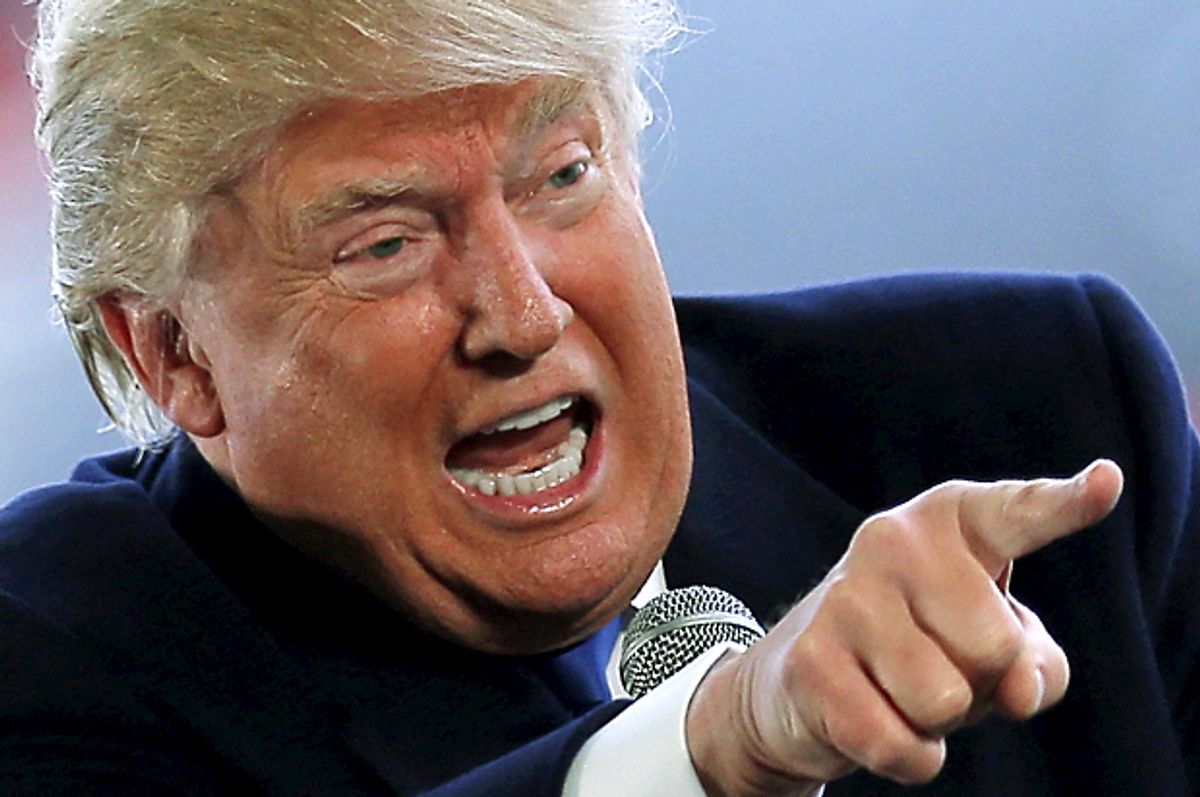By now, it’s well known that the Republican party and mainstream conservatives slept on the threat of Donald Trump. One grand old man or power broker after another thought that Trump’s fame would help the GOP, or the conservative movement -- that he could be contained, that he was only joking, or something like that. Even a politician as cautious as Mitt Romney sought Trump’s endorsement; Romney has since woken up to the threat the mogul poses. But it’s a bit late now.
So it’s been strange – provoking a mix of frustration and gratitude – to see journalists doing something similar. The latest comes from Matthew Yglesias, who begins his piece in Vox this way:
I was a liberal Donald Trump apologist. Not a liberal enjoying the chaos Trump was sowing in the Republican Party, but someone who welcomed his ideological heterodoxy as a step away from the cliff of endless polarization that offered a more moderate substantive agenda than Marco Rubio's. I held on to that conviction through Friday's protest violence and Saturday's torrent of "enough is enough" takes.
I was wrong. Sunday morning, in the context of what he knew to be a growing controversy about violent behavior on the part of his supporters, Trump tweeted what can really only be interpreted as a threat to send goons to beat up Bernie Sanders supporters.
Again, it’s taken him a while to get there. But it’s not fair to single out Yglesias, who is a substantial writer. A lot of journalists, and an entire, influential website, have slept on the question of whether Trump was as dangerous as he seemed.
On the same day last December that Trump called for a total ban on Muslim’s entering the United States, the Huffington Post decided to take the him seriously as a candidate.
On the heels of Trump's proposed change for America, we will be changing how we cover him at The Huffington Post. Back in July, we announced our decision to put our coverage of Trump's presidential campaign in our Entertainment section instead of our Politics section. "Our reason is simple," wrote Ryan Grim and Danny Shea. "Trump's campaign is a sideshow."
Since then Trump's campaign has certainly lived up to that billing. But as today's vicious pronouncement makes abundantly clear, it's also morphed into something else: an ugly and dangerous force in American politics. So we will no longer be covering his campaign in Entertainment. But that's not to say we'll be treating it as if it were a normal campaign.
These journalists are all smart people. And they are not conservatives – like David Brooks, Ross Douthat, or Joe Scarborough, all of whom seem to be waking up to Trump a little late as well. These three have ideological reasons to give Trump the benefit for of the doubt.
So what’s with their taking so long to realize that Trump is a serious candidate and increasingly, a dangerous candidate?
Part of it is something that devils journalism these days: contrarianism. The web has done some good things to the field, as well as some bad things. Even contrarianism can be engaging and smart: Look at the late Christopher Hitchens, who was often wrong, but wrote intelligently about a huge range of topics.
If you don’t write for a living, you may not have a sense of just how tempting contrarianism is, or how it allows you to stand out by going against the grain on just about any issue. On Trump, for example, instead of joining the chorus when the candidate says or does something outrageous, you take a he’s-not-so-bad position. You don’t have to be a cynic to do this: It’s an occupational hazard of writing for the web, and it requires constant vigilance.
Clearly, contrarianism, online opinion, and a truculent candidate add up to a pretty foul brew. That’s what the headline to Yglesias’s story makes evident: “I can't be contrarian about Donald Trump anymore: He's terrifying.” (For what it’s worth, the scribe avoids the c-word in the article itself.)
And HuffPo was likely trying to avoid dignifying the mogul's candidacy with the same coverage it gave more traditional candidates. But it also found a way to stand out from the coverage of rival sites.
Here’s one writer’s suggestion for sure-fire contrarian pieces:
Actually, That Orange Juice Isn’t Helping You Recover From The Cold
Like The Beatles? Why You Probably Have Dog Feces For Brains
Why Everything You Thought You Knew About Toast Is Wrong And Pathetic, Loser
Sorry, But If You Breastfeed Your Child, You’re A Worse Mother Than Hitler Would Have Been If He Had Been A Mother, Which, Admittedly, He Was Not
So You Thought George Washington Was The First President? Think Again, Jerkass
Actually, Something Something Girls
Scribe D.J. Pangburn describes online contrarianism this way: “One blogger is a Celine Dion apologist, while the next is pontificating on Michael Bay’s auteur filmmaking.”
Some pundits may mock Yglesias and others, like David Brooks, who are getting tough on Trump a little late in the game. But let’s not be nasty about this. Trump is for real, so let’s thank anyone we see waking up to his threat. When it comes to recognizing danger, better late than never.



Shares